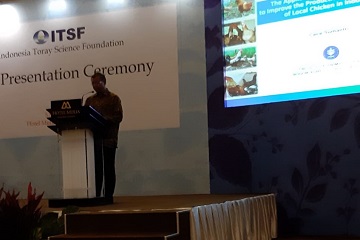IPB Professor Wins the Prestigious ISTF Science and Technology Award

The professor of the Faculty of Animal Sciences IPB University, Prof. Cece Sumantri wins the Indonesia Toray Science Foundation (ITSF) Science and Technology Award with the prize of Rp 100 million. Prof. Cece wins this award for his research about molecular genetics for productivity and quality development of Indonesia’s local chicken.
The award was given in Hotel Mulia Ballroom, Jakarta (5/3) by ITSF Chairman, Dr. LT Handoko, which is also the Chairman of Indonesian Institute of Sciences (LIPI), Executive Vice President Toray Industries Inc., and representatives from the Ministry of Research, Technology, and Higher Education, the Ministry of Education and Culture, and the Embassy of Japan.
According to Prof. Cece, Indonesian local chickens have a high genetic diversity. His research succeeded in identifying marker genes in kampung chickens, which were used in the selection process for breeding. The results of this development are local chicken varieties named IPB-D1, which can grow fast, have high-quality meat and are more resistant to disease attacks.
IPB-D1 chicken is a broiler chicken which originated from kampung chicken with broiler chicken. The growth of IPB D1 chicken is fairly fast because it only takes 10 weeks to reach 1.2 kilograms. IPB D1 chicken breeding has been applied at Sinar Harapan Farm, Sukabumi, West Java. Local chickens also have a higher resistance to diseases such as diseases caused by Salmonella spp.
“Endemic chicken or local chicken is disease-resistant, has good meat, healthy, and organic. Because the feed is acquired naturally by the chicken,” said Prof. Cece.
Besides, Indonesia’s local chicken has a high selling price. One example is Sumatran chicken. The DOC price of Sumantran chicken can reach Rp 2 million per head if it is exported. Whereas mature local chicken, when sold domestically, is priced Rp 70 to 100 thousand per head. Few local chickens like Ketawa Chicken, Pelung Chicken, and Cemeni Chicken can reach thousands of rupiah per head.
Given this potential, local chickens can be developed in disadvantaged villages so that they can help improve the economy of the local community. Meanwhile, people who maintain local chickens, generally kampung chickens, can increase their protein intake by eating their own chicken.
Maintenance of kampung chicken is rather easy. Kampung chicken can be kept in a cage made around the house with a size that is adjusted to the number of chickens that are kept. In fact, with a narrow land can also maintain the native chicken.
For feed, breeders can utilize existing natural resources such as bran, rice bran, corn, cassava, worms, and snails. Chicken worms and snails are needed as a source of protein, so the chicken will have a strong endurance.
Not only the household scale, local chicken livestock also has the potential to be developed on an industrial scale. Industrial scales that can be developed include the chicken industry, broiler local chicken and laying local chicken.
It turns out that native Indonesian chicken can be used as a recreational purpose. Because the local Indonesian chicken has its own uniqueness, such as laughing chicken and pelung chicken. Laughing chicken can be used as a recreational vehicle because the sound produced is like people laughing.
This potential has now been level up by the establishment of a community of laughing chickens and pelung chickens. Through it, the community was invited to preserve Indonesian native chickens, especially the laughing chicken, so it would not become extinct.
In addition to the award, the foundation, which was funded by Toray Industries Inc., an industrial company from Japan, also awarded the Science Education Award, an award for 10 science teachers in junior and senior high schools as well as equivalent schools, who have developed innovative science teaching methods. Each award recipient received a prize of Rp 25 million.
ITSF also provided research assistance funds to 18 researchers from universities and research institutions, with a total value of assistance of Rp 700 million.



